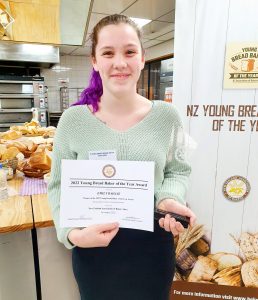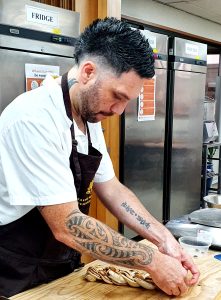Media Release: 16 November 2023
 A Dunedin plant bread baker has taken out the 2023 Young Bread Baker of the Year Award. Tyrone Harvey of Quality Bakers Dunedin receives a research grant of up to $15,000 from the New Zealand Association of Bakers.
A Dunedin plant bread baker has taken out the 2023 Young Bread Baker of the Year Award. Tyrone Harvey of Quality Bakers Dunedin receives a research grant of up to $15,000 from the New Zealand Association of Bakers.
Tyrone competed over two days carrying out demanding theoretical and practical testing. While he was surprised by his win, he says he received a lot of encouragement from colleagues to enter. “Putting in the effort to prepare was worth it. I’m not sure what response I’ll get when I arrive back to work. Maybe they’ll get me to shout a BBQ.” Being reserved and preferring to be out of the limelight, Tyrone says the most challenging part of the competition for him was talking to the judges about the product he made.
Judges Joe Jarkiewicz, Grant Inns, Nathan Roberts, and Tania Watson said Tyrone was the clear winner who stood out from the rest because he did well in all facets of the competition. Judging Co-ordinator Tania Watson says Tyrone stepped out of his comfort zone to participate, was a good team player, and was conscious of health and safety in the bakery. “He was first to finish, he was organised, and he helped clean up too,” says Tania.
Tyrone has been baking since 2013. After five years at Countdown in Auckland and a short stint at New World, he joined Quality Bakers Auckland in 2019, then moved to Quality Bakers in Dunedin two months ago, where he is Chief Baker. He completed his Level 4 Plant Baking qualification this year. His focus at work is on producing small goods but he says what he really enjoys is the science behind baking, as knowing how everything works makes it easy to solve problems if they arise.
The competition requires entrants to demonstrate their ability in three areas: a presentation on a given research topic, a 90-minute exam which tests their theoretical knowledge of baking technology, and a five-hour practical session in which they bake a variety of bread-based products. 
Judging Co-ordinator Tania Watson says the aim of the competition is to find bakers with potential whose talents can be nurtured through mentoring and development opportunities. “It’s always good to have both plant and craft bakeries represented as they bring different strengths to the competition. We were pleased to have bakers from diverse backgrounds and both the North and South Islands.”
Judge Grant Inns says he wanted to make sure each entrant walked away from the competition feeling confident and proud. Learning and growing is a big part of it,” he said.
Judge Joe Jarkiewicz says he is always keen to see young people compete because of the extra knowledge they gain.
Judge Nathan Roberts, a past competitor himself, says the competition is a huge stepping stone and an opportunity for young bakers to progress their career. “You learn things at the competition that you wouldn’t learn in your everyday job.”
The Young Bread Baker of the Year Competition is sponsored by the New Zealand Association of Bakers and is designed to promote excellence in people emerging from their training.
Follow us on Facebook: Young Bread Baker of the Year
For more information, please contact
Tania Watson – Judging Coordinator
New Zealand Association of Bakers
E: tania@bakingresearch.org.nz
M: 021 1659949

 A Christchurch craft bread baker has won the 2022 Young Bread Baker of the Year Award after two days of demanding theoretical and practical testing.
A Christchurch craft bread baker has won the 2022 Young Bread Baker of the Year Award after two days of demanding theoretical and practical testing. Judging Co-ordinator Tania Watson says Emily won because she did well in both theory and practical sections. “We’ve invited her back next year to try out to be a representative at the 2024 LA Judge Competition in Australia.”
Judging Co-ordinator Tania Watson says Emily won because she did well in both theory and practical sections. “We’ve invited her back next year to try out to be a representative at the 2024 LA Judge Competition in Australia.” Runner-up Mike Malloy, a Production Manager at Quality Bakers in Auckland, entered the competition to challenge himself to keep his hand in with practical baking skills and the opportunity to network with the other competitors. Mike says he will use his research grant to look at bakeries and baking elsewhere. “I’m really interested in seeing overseas plant bakeries and the latest products.”
Runner-up Mike Malloy, a Production Manager at Quality Bakers in Auckland, entered the competition to challenge himself to keep his hand in with practical baking skills and the opportunity to network with the other competitors. Mike says he will use his research grant to look at bakeries and baking elsewhere. “I’m really interested in seeing overseas plant bakeries and the latest products.”
